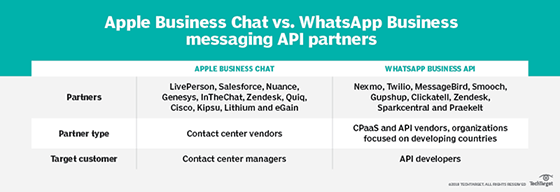Apple Business Chat vs. WhatsApp business messaging API partners
WhatsApp is taking a different approach than Apple when it comes to business messaging APIs. Tsahi Levent-Levi explains how WhatsApp is differentiating with vendor partnerships.
WhatsApp launched its WhatsApp Business API platform in August. And while it is similar to Apple Business Chat, the two business messaging services have different partner strategies: WhatsApp is focusing on API vendors, and Apple is focusing on contact center vendors.
The WhatsApp Business API platform allows organizations to connect with their customers over WhatsApp in a programmable fashion, with features including the automation order status information, access to support services and click-to-chat buttons for websites.
According to a blog post, WhatsApp is working directly with a select number companies that specialize in managing customer communications. WhatsApp isn't looking to offer a developer API experience for a wide range of organizations. Instead, the vendor is focusing on larger businesses and closing the gap through partnerships.
At face value, the WhatsApp business messaging approach is similar to that of Apple Business Chat. The differences, however, are apparent by the choice of launch customers and partners (see below).
Apple's approach to its business messaging partners is simple: Apple partners with contact center vendors and allows them to work with Business Chat APIs in a controlled fashion, which lets Apple vet the integration and user experience. Following Apple's approval, partners offer Apple Business Chat capabilities to their contact center customers.
Taking a different approach to partnerships, WhatsApp focuses on three types of vendors: communications-platform-as-a-service (CPaaS) vendors, contact center vendors and organizations in developing countries.
Bringing messaging APIs to CPaaS vendors
WhatsApp allows CPaaS vendors to work with the business messaging APIs and figure out their limitations. Organizations and other vendors that wish to use WhatsApp Business messaging can pick one of the partners and build whatever capabilities they see fit on top of the partner's API.
WhatsApp's approach opens its business messaging platform and APIs to a larger set of use cases than what Apple Business Chat offers. Apple is looking to control the whole experience, while WhatsApp maintains control by working with a small number of partners and letting them figure out some of the use cases and experiences.
Some of WhatApp's partners, like Smooch, Gupshup and Clickatell, are not exactly CPaaS vendors, but their services focus on embedding communications into apps, websites and contact center platforms through APIs. None of these vendors got early access to Apple Business Chat. It seems like Apple is not looking to open up the platform for partners to develop use cases they haven't already thought about.

Partnering with messaging-focused contact center vendors
WhatsApp's choice of Zendesk and Sparkcentral as contact center partners is interesting. The two vendors aren't traditional contact center providers, as their services aren't centered on voice, unlike Apple's contact center partners, including Cisco, Genesys and Nuance, which still have a focus on voice.
Zendesk is the only contact center vendor that is an official partner of both Apple Business Chat and WhatsApp Business API.
Business messaging in developing countries
While Apple is catering to the developed world, a lot of WhatsApp's users are in developing countries. It make sense, then, that Praekelt, based in Johannesburg, South Africa, is one of the launch partners for WhatsApp Business API, with the intention of focusing on use cases suited to the African continent. While all of the other WhatsApp partners are businesses, Praekelt is a nonprofit that uses mobile technology to support people living in poverty.
Focusing on developing countries can create new opportunities for WhatsApp, and its partners can help WhatsApp better understand the needs in these countries, experiment with different use cases and delivery models, and help them become entrenched as the dominant messaging vendor.
No winner takes all in business messaging
The question of Apple Business Chat versus WhatsApp Business API isn't an either-or decision for vendor partners and business customers alike. They will need to support both, as CPaaS vendors like Twilio, Nexmo and MessageBird provide omnichannel messaging capabilities. Developers can define and implement a workflow for use on different social messaging platforms.
While some customers will use Apple Business Chat, others will choose WhatsApp, Facebook Messenger or other business messaging service. Organizations cannot and should not expect customers to use only one specific channel. The social messaging space won't be in a winner-takes-all situation, where one vendor will have exclusive access to users -- at least not in the foreseeable future.








